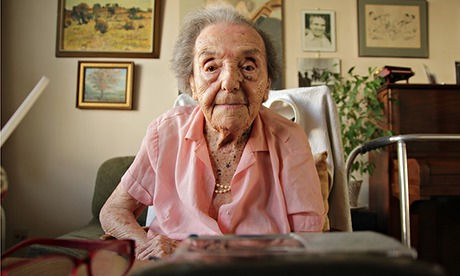http://nickreedent.com/

lice Herz-Sommer: 'Everything we experience is a gift we should pass on'
Oldest known survivor of the Holocaust, who has died aged 110, is the subject of Oscar-nominated film The Lady in Number 6

Alice Herz-Sommer died in London on Sunday at the age of 110. Photograph: AP
If a 38-minute documentary, The Lady in Number 6, wins an Oscar next weekend, it will stand as a fitting memorial to its subject, Alice Herz-Sommer. The oldest known survivor of the Nazi concentration camps, who has died aged 110, preferred all her long life to speak of the joy music brought her rather than the horrors she had witnessed in Theresienstadt.
The executive producer of the film, Fredric Bohbot, told Radio 4: "She is the most incredible person I have ever met. I think she had no material desires, she was very curious about everyone and she had no hatred in her. She loved everyone in so many ways."
Interviewed for the film – in which one of her neighbours describes the bliss of sharing the block of flats in north London and hearing classical music beautifully played every morning and afternoon – Herz-Sommer described her life as full of joy. "I think I am in my last days but it doesn't really matter because I have had such a beautiful life. And life is beautiful, love is beautiful, nature and music are beautiful. Everything we experience is a gift, a present we should cherish and pass on to those we love."
Karen Pollock, chief executive of the Holocaust Educational Trust, said: "With the passing of Alice Herz-Sommer, we are once again reminded that Holocaust survivors will not be with us for ever. We must all take on the responsibility to ensure that the horrors they endured are never forgotten."
Herz-Sommer was born in 1903 in Prague, into a prosperous, cultured and musical Moravian family. Her mother had been a childhood friend of the composer Gustav Mahler, and Herz-Sommer remembered the premiere of his second symphony when she was about eight. She also vividly recalled another family friend, "Uncle Franz", the author Franz Kafka.
Her talent was recognised when she was only five, and she had lessons with Conrad Ansorge, who had been a pupil of Franz Liszt ("as a pianist, extraordinary, as a teacher, not so good", she told the Guardian).
By her mid-teens she herself was teaching and touring as a pianist. She married her musician husband, Leopold Sommer, a fortnight after meeting him in 1931, and they had one son, Raphael, who became a concert cellist.
In an interview with the Guardian a few years after she reluctantly gave up daily swims at the age of 97, she recalled that the three were allowed to stay on in their flat, with Nazi neighbours on every side, for some time after Hitler invaded Czechoslovakia and most of the Jews of Prague were sent to a ghetto. Then in 1943 the inevitable order came: they were sent to Theresienstadt.
"The evening before this we were sitting in our flat. I put off the light because I wanted my child to sleep for the last time in his bed. Now came my Czech friends: they came and they took the remaining pictures, carpets, even furniture. They didn't say anything; we were dead for them, I believe. And at the last moment the Nazi came – his name was Hermann – with his wife. They bought biscuits and he said, 'Mrs Sommer, I hope you come back with your family. I don't know what to say to you. I enjoyed your playing – such wonderful things, I thank you.' The Nazi was the most human of all."
In another interview she recalled asking: "If they have an orchestra in Terezin, how bad can it be?" Despite being run as a show camp to impress visitors including the Red Cross, almost 35,000 prisoners died there, including her mother. Herz-Sommer's music saved her life: she became a member of the camp orchestra, and played in more than 150 concerts, including special performances for the Red Cross inspectors. Her husband died soon after being moved to Auschwitz and then Dachau in 1944, but her son, who also performed in children's operas, was among 130 survivors of 15,000 children sent to the camp.
In another interview she recalled: "We performed in the council hall before an audience of 150 old, hopeless, sick and hungry people. They lived for the music. It was like food to them. If they hadn't come they would have died long before. As we would have."
After the war she lived for many years in Israel, teaching and performing, but moved to London in 1986 with her son and his family. He died in 2001 while on a concert tour, aged 65.
Herz-Sommer's grandson, Ariel Sommer, said she died peacefully on Sunday morning – only two days after she was admitted to hospital – with her family by her bedside.
In an interview with the Israeli newspaper Haaretz, when she was 106, she was full of joy and gratitude: "What I have learned, at my advanced age, is to be grateful that we have a nice life. There is electricity, cars, telegraph, telephone, internet. We also have hot water all day long. We live like kings. I even got used to the bad weather in London."
No comments:
Post a Comment